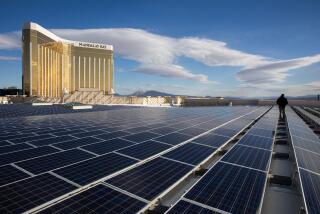Arco Ignores Curve in Road, Looks Beyond
- Share via
One of the charges frequently leveled at American corporations is that they are preoccupied with the short term. Short-term thinking has resulted in a failure to push new technology and insufficient emphasis on the kind of research and development that produces profits in 5 or 10 years rather than immediately.
So it’s encouraging to find an example of the opposite thinking and to find it in a situation where there was an excuse to think short term and cut the company’s losses.
Atlantic Richfield’s 9-year-old subsidiary, Arco Solar, was launched amid skyrocketing oil prices with the goal of developing an alternative energy source. With most forecasters saying that even $40-a-barrel oil would appear cheap in a few years, Arco had high hopes of making solar a significant addition to the nation’s energy capacity.
Since then, of course, oil prices have turned down dramatically, destroying any real hope that new technologies will provide competitively priced energy any time soon. There is a question of whether research into such technology will continue to any great extent; already, government support is fast dwindling.
Arco Solar is one part of the research effort that apparently will survive. It has survived a major restructuring by its parent company and some drastic belt-tightening of its own. It keeps going because Arco is willing to look beyond the continuing red ink at Arco Solar to a day when solar devices become a commercial success, even on a modest scale.
Unexpected Results
It also keeps going because Arco Solar has demonstrated how dogged investment in research and development can produce some unexpected results. Those results could make Arco Solar profitable no matter what happens to the price of oil.
The initial idea was for Arco Solar to develop large fields of photovoltaic cells that would convert the sun’s energy directly into electricity, supplying power to homes and offices. It completed a plant in just six months to supply power to Southern California Edison, enough to serve 400 homes. Without special tax credits, the plant would not have been financially viable. Still, it will stand as a reminder that the process works if energy ever does become dear again.
In the meantime, Arco Solar has focused its attention on some more specialized uses for photovoltaics. Currently, much of its revenue comes from selling power units for remote locations--microwave repeater stations and navigation buoys, to name just two--where bringing in standard forms of power is difficult and expensive. The solar units are the most economical form of energy for such applications and the business, small though it is, is growing by 25% to 30% a year, says James H. Caldwell Jr., Arco Solar’s president.
That’s not enough sales for staying alive, but there’s more coming. Arco Solar’s cells are beginning to show up in small consumer products like calculators, watches and toys. That’s a big market and one that could lead Arco Solar into the black.
The challenge beyond that is to make solar units competitive with diesel generators on a broader scale than just on mountaintops. Caldwell believes it’s possible.
Continued R&D; Outlays
Arco Solar has managed to develop these markets by continuing to push research and development--it still spends 35% to 40% of its revenues on R&D;, many times what most companies budget. And it is doing so even as government tax incentives expire.
The importance of such companies as Arco Solar becoming a commercial success even on a small scale is that it keeps the basic research effort in place in case alternative energy supplies are ever needed on a big scale.
“We’ve got a research effort that’s geared to the long term,” says Caldwell. “We know now what the materials are and what the process is.” Moreover, he figures that building the plant to supply Edison demonstrated how quickly a unit can be brought into service, a matter of months rather than years for standard power plants. If there ever is another energy crunch, Caldwell believes that solar could be a significant source of energy within three years.
That time may never come, but Arco Solar may well be around anyway.
More to Read
Inside the business of entertainment
The Wide Shot brings you news, analysis and insights on everything from streaming wars to production — and what it all means for the future.
You may occasionally receive promotional content from the Los Angeles Times.










